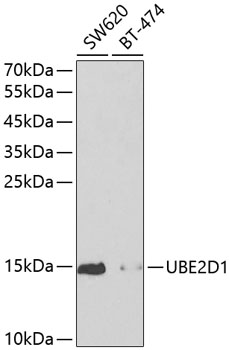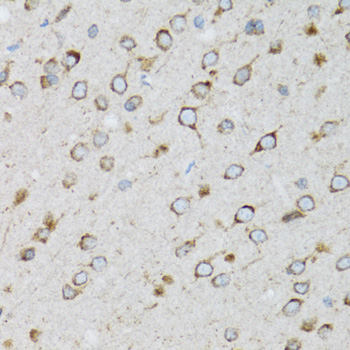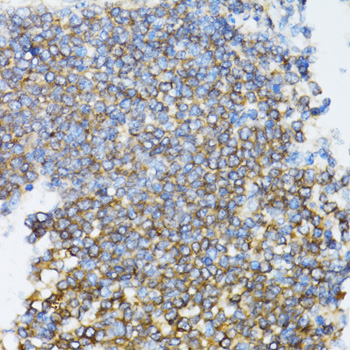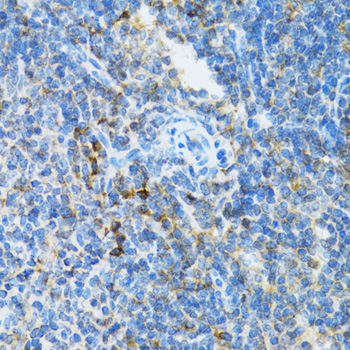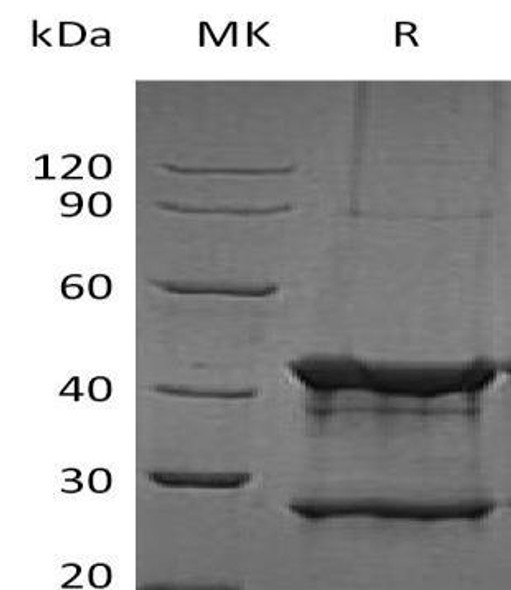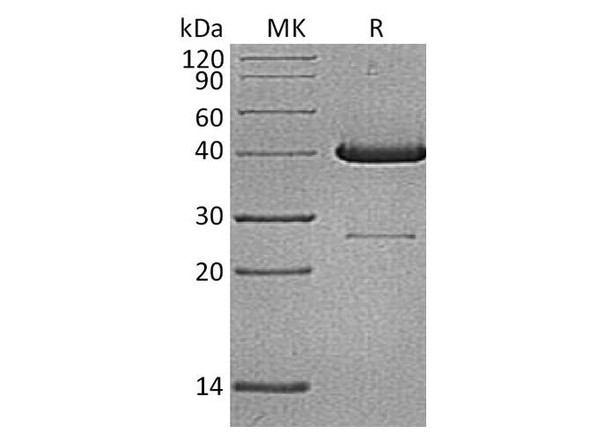Signal Transduction Antibodies 2
Anti-UBE2D1 Antibody (CAB1951)
- SKU:
- CAB1951
- Product Type:
- Antibody
- Reactivity:
- Human
- Reactivity:
- Mouse
- Reactivity:
- Rat
- Host Species:
- Rabbit
- Isotype:
- IgG
- Research Area:
- Signal Transduction
Description
| Antibody Name: | Anti-UBE2D1 Antibody |
| Antibody SKU: | CAB1951 |
| Antibody Size: | 20uL, 50uL, 100uL |
| Application: | WB IHC |
| Reactivity: | Human, Mouse, Rat |
| Host Species: | Rabbit |
| Immunogen: | Recombinant fusion protein containing a sequence corresponding to amino acids 1-147 of human UBE2D1 (NP_003329.1). |
| Application: | WB IHC |
| Recommended Dilution: | WB 1:500 - 1:2000 IHC 1:50 - 1:200 |
| Reactivity: | Human, Mouse, Rat |
| Positive Samples: | SW620, BT-474 |
| Immunogen: | Recombinant fusion protein containing a sequence corresponding to amino acids 1-147 of human UBE2D1 (NP_003329.1). |
| Purification Method: | Affinity purification |
| Storage Buffer: | Store at -20'C. Avoid freeze / thaw cycles. Buffer: PBS with 0.02% sodium azide, 50% glycerol, pH7.3. |
| Isotype: | IgG |
| Sequence: | MALK RIQK ELSD LQRD PPAH CSAG PVGD DLFH WQAT IMGP PDSA YQGG VFFL TVHF PTDY PFKP PKIA FTTK IYHP NINS NGSI CLDI LRSQ WSPA LTVS KVLL SICS LLCD PNPD DPLV PDIA QIYK SDKE KYNR HARE WTQK YAM |
| Gene ID: | 7321 |
| Uniprot: | P51668 |
| Cellular Location: | Cytoplasm |
| Calculated MW: | 16kDa |
| Observed MW: | 14kDa |
| Synonyms: | UBE2D1, E2(17)KB1, SFT, UBC4/5, UBCH5, UBCH5A |
| Background: | The modification of proteins with ubiquitin is an important cellular mechanism for targeting abnormal or short-lived proteins for degradation. Ubiquitination involves at least three classes of enzymes: ubiquitin-activating enzymes, or E1s, ubiquitin-conjugating enzymes, or E2s, and ubiquitin-protein ligases, or E3s. This gene encodes a member of the E2 ubiquitin-conjugating enzyme family. This enzyme is closely related to a stimulator of iron transport (SFT), and is up-regulated in hereditary hemochromatosis. It also functions in the ubiquitination of the tumor-suppressor protein p53 and the hypoxia-inducible transcription factor HIF1alpha by interacting with the E1 ubiquitin-activating enzyme and the E3 ubiquitin-protein ligases. Two transcript variants encoding different isoforms have been found for this gene. |
| UniProt Protein Function: | UBE2D1: Accepts ubiquitin from the E1 complex and catalyzes its covalent attachment to other proteins. In vitro catalyzes 'Lys- 48'-linked polyubiquitination. Mediates the selective degradation of short-lived and abnormal proteins. Functions in the E6/E6-AP- induced ubiquitination of p53/TP53. Mediates ubiquitination of PEX5 and auto-ubiquitination of STUB1, TRAF6 and TRIM63/MURF1. Ubiquitinates STUB1-associated HSP90AB1 in vitro. Lacks inherent specificity for any particular lysine residue of ubiquitin. Essential for viral activation of IRF3. Mediates polyubiquitination of CYP3A4. Belongs to the ubiquitin-conjugating enzyme family. |
| UniProt Protein Details: | Protein type:Ubiquitin conjugating system; EC 6.3.2.19; Ubiquitin ligase; Ligase Chromosomal Location of Human Ortholog: 10q21.1 Cellular Component: nucleoplasm; protein complex; cytoplasm; cytosol; ubiquitin ligase complex Molecular Function:protein binding; ubiquitin-protein ligase activity; ATP binding; ligase activity Biological Process: positive regulation of ubiquitin-protein ligase activity during mitotic cell cycle; ubiquitin-dependent protein catabolic process; transcription initiation from RNA polymerase II promoter; negative regulation of ubiquitin-protein ligase activity during mitotic cell cycle; protein polyubiquitination; transcription, DNA-dependent; MyD88-independent toll-like receptor signaling pathway; toll-like receptor 3 signaling pathway; negative regulation of transcription from RNA polymerase II promoter; BMP signaling pathway; regulation of ubiquitin-protein ligase activity during mitotic cell cycle; anaphase-promoting complex-dependent proteasomal ubiquitin-dependent protein catabolic process; positive regulation of protein ubiquitination; transforming growth factor beta receptor signaling pathway; mitotic cell cycle spindle assembly checkpoint; toll-like receptor signaling pathway; innate immune response; gene expression; mitotic cell cycle; toll-like receptor 4 signaling pathway |
| NCBI Summary: | The modification of proteins with ubiquitin is an important cellular mechanism for targeting abnormal or short-lived proteins for degradation. Ubiquitination involves at least three classes of enzymes: ubiquitin-activating enzymes, or E1s, ubiquitin-conjugating enzymes, or E2s, and ubiquitin-protein ligases, or E3s. This gene encodes a member of the E2 ubiquitin-conjugating enzyme family. This enzyme is closely related to a stimulator of iron transport (SFT), and is up-regulated in hereditary hemochromatosis. It also functions in the ubiquitination of the tumor-suppressor protein p53 and the hypoxia-inducible transcription factor HIF1alpha by interacting with the E1 ubiquitin-activating enzyme and the E3 ubiquitin-protein ligases. Two transcript variants encoding different isoforms have been found for this gene. [provided by RefSeq, Mar 2011] |
| UniProt Code: | P51668 |
| NCBI GenInfo Identifier: | 1717848 |
| NCBI Gene ID: | 7321 |
| NCBI Accession: | P51668.1 |
| UniProt Related Accession: | P51668 |
| Molecular Weight: | |
| NCBI Full Name: | Ubiquitin-conjugating enzyme E2 D1 |
| NCBI Synonym Full Names: | ubiquitin conjugating enzyme E2 D1 |
| NCBI Official Symbol: | UBE2D1 |
| NCBI Official Synonym Symbols: | SFT; UBCH5; UBC4/5; UBCH5A; E2(17)KB1 |
| NCBI Protein Information: | ubiquitin-conjugating enzyme E2 D1 |
| UniProt Protein Name: | Ubiquitin-conjugating enzyme E2 D1 |
| UniProt Synonym Protein Names: | Stimulator of Fe transport; SFT; UBC4/5 homolog; UbcH5; Ubiquitin carrier protein D1; Ubiquitin-conjugating enzyme E2(17)KB 1; Ubiquitin-conjugating enzyme E2-17 kDa 1; Ubiquitin-protein ligase D1 |
| UniProt Gene Name: | UBE2D1 |
| UniProt Entry Name: | UB2D1_HUMAN |


